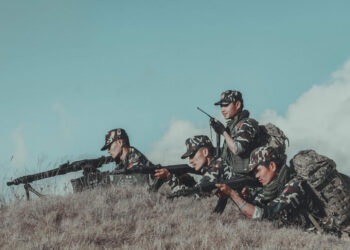CHIANG MAI, Thailand — The Peace Process Steering Team (PPST) of eight ethnic group signatories to the nationwide ceasefire agreement (NCA) said a Joint Ceasefire Implementation Committee Meeting (JICM) needed to be called to review misunderstandings that emerged after the second session of the 21st Century Panglong peace conference in May.
The JICM, whose representatives are from the government, Tatmadaw (Myanmar Army) and ethnic armed organizations (EAOs), have the authority to make decisions on the review of the NCA.
The PPST, led by the Karen National Union (KNU) and the Restoration Council of Shan State (RCSS), held a two-day meeting in Chiang Mai, Thailand on Aug. 9-10.
The misunderstandings from the peace conference were due to a “lack of common understanding of the NCA provisions, vagueness regarding decision-making power and inadequate time,” said U Than Khe, the chairman of the All Burma Students’ Democratic Front (ABSDF), at a press briefing after Thursday’s meeting.
“Thus, joint implementation and joint ceasefire monitoring have not been in place,” he said, adding that they have focused their efforts on implementing them.
At the KNU headquarters in Lay Wah from July 20-27, the PPST held review meetings on the strengths and weaknesses of the NCA, including the 37 principles, which were agreed to as Part 1 of the Union Accord in Naypyitaw in May.
Its Peace Process Working Team (PPWT) also had a series of talks this week, as well as talks with the government peace commission on August 3. The results of the talks were then brought to PPST leaders.
Col Khun Okkar, a PPST spokesperson, said: “our reviews were based on an optimistic approach in order to achieve the NCA implementation and the overall attainment of the peace process.”
He added that the reviews on NCA implementation were done to build strong principles for the peace process, and urged stakeholders—from the government, and national and international observers—not to worry, in light of questions regarding whether the peace process would come undone.
Khun Okkar said there would be changes made to have a more collaborative approach in the future among concerned NCA implementation mechanisms, working committees and secretariats, and that these changes would start after October 15, the two year anniversary of the signing of the NCA.
The PPST wants to change the implementation structure as well as the approach, but will continue under the current structure for the next two months to maintain understanding among the government, Myanmar Army, political parties and EAOs.
Maintaining understanding, which the PPST refers to, is in regard to a KNU shuffle in July in which the KNU moved to replace its own vice chairman Padoh Saw Kwe Htoo Win—also the Union Peace Dialogue Joint Committee (UPDJC) vice chairman—with the KNU’s current general secretary Padoh Saw Tadoh Moo in the role of the UPDJC delegate. The shift has concerned stakeholders, and the delegate position would need to be approved by the other NCA signatories.
The government has voiced concerns that this replacement would affect the peace process, and that the change in UPDJC representation would affect unity and understanding.
PPST leaders said they hoped that there would be more NCA signatories in the near future, and this is why they were taking the time to restructure the NCA implementation bodies and review the political dialogue framework.
In a statement, the PPST said it hoped that talks on Friday between the government and the United Nationalities Federal Council would yield positive results.

















